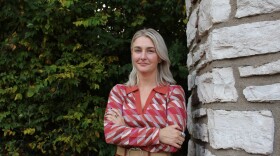
Bram Sable-Smith
Midwest Correspondent | KFF Health NewsBram Sable-Smith is a Midwest Correspondent for KFF Health News based in St. Louis.
Sable-Smith joined KFF Health News after eight years covering public health and the social safety net for Wisconsin Public Radio, The Wisconsin Center for Investigative Journalism, KBIA in Columbia, Missouri, and as a founding reporter of Side Effects Public Media — a public media reporting collaborative in the Midwest. He also taught radio journalism at the University of Missouri School of Journalism.
His reporting has received national recognition, including two Edward R. Murrow Awards, two Sigma Delta Chi Awards and two health policy awards from the Association of Health Care Journalists.
-
Children are particularly vulnerable to the stresses of gun violence, and 10 of 24 people injured by bullets at the Feb. 14 parade to celebrate the Kansas City Chief's victory were under 18 years old.
-
The families of people hurt during a mass shooting at the Super Bowl rally in Kansas City last February face what one expert calls "victimization debt."
-
Despite the rise of gun violence in America, few medical guidelines exist on removing bullets from survivors’ bodies — leaving lasting impacts for survivors.
-
Ballot initiatives are one way for voters to assert their power over the political whims of Missouri's state legislature or courts. They are often viewed as more stable and harder to undo.
-
In the first of the series “The Injured,” a Kansas family remembers Valentine’s Day as the beginning of panic attacks, life-altering trauma, and waking to nightmares of gunfire. Thrown into the spotlight by the shootings, they wonder how they will recover.
-
In Missouri, legislation introduced by State Rep. Melanie Stinnett, R-Springfield, aims to establish a gold carding program for medical treatment and prescriptions.
-
Missouri is one of at least 11 states considering abortion-related ballot measures for next year, part of the wave of such actions since the Supreme Court’s decision on Dobbs v. Jackson Women’s Health Organization.
-
Every state has at least some statute or case law that considers a fetus a person. Missouri is among at least 10 states with personhood language that is so broad it could be interpreted to apply to all civil and criminal laws, according to a report from Pregnancy Justice, a nonprofit that advocates for the rights of pregnant people.
-
Missouri has nearly 73,000 people waiting to have their Medicaid applications processed, more than the number of people enrolled in the expansion of the federal-state health insurance program. Although most states process Medicaid applications within a week, Missouri is taking, on average, more than two months. Patient advocates fear that means people will stay uninsured longer, leading them to postpone care or get stuck with high medical bills.
-
The pandemic exposed how old-school tech hampers access to health care and other public services. With new federal funding, states finally have a way to upgrade, if they seize the opportunity.
-
Voters in Missouri and Oklahoma approved Medicaid expansion to begin in 2021. But while Oklahoma has enrolled over 200,000 people so far, Missouri has enrolled fewer than 20,000. Why are two such similar states handling the public insurance rollout so differently?
-
An estimated 275,000 Missouri adults can get dental insurance now as the state has expanded who is eligible for Medicaid. But with so few dentists participating in the program, the state’s already-backlogged clinics are facing a glut of new clients.












